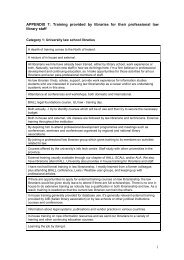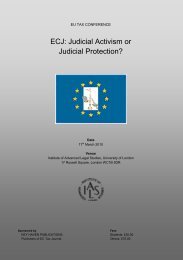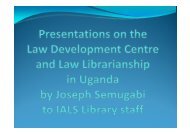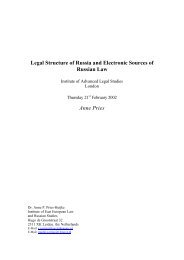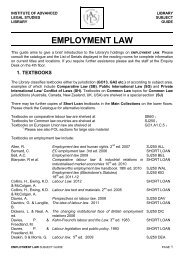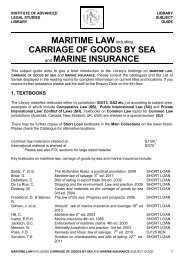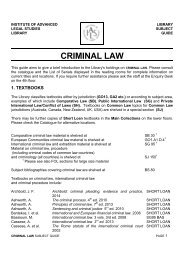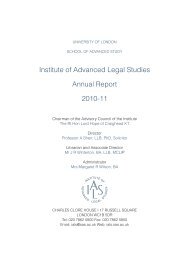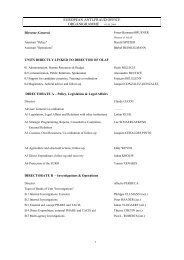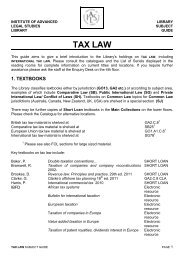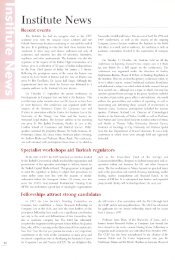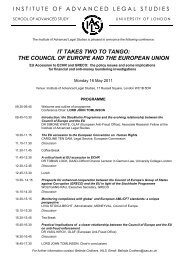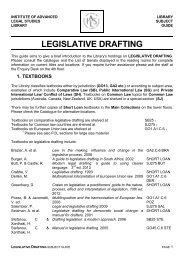a thesis - Institute of Advanced Legal Studies
a thesis - Institute of Advanced Legal Studies
a thesis - Institute of Advanced Legal Studies
You also want an ePaper? Increase the reach of your titles
YUMPU automatically turns print PDFs into web optimized ePapers that Google loves.
8 TRUSTS IN GENERAL.<br />
himself be, and <strong>of</strong>ten is, the trustee (see Lewin, Trusts^ 10th<br />
ed. 12), and it is meaningless to speak <strong>of</strong> a person reposing a<br />
confidence in himself.<br />
Mr. Underbill (Trusts and Trustees, 4th ed. 5), however, notes<br />
two distinctions <strong>of</strong> the kind sought. These are:—<br />
(1) That a trust, no matter how created, can be enforced<br />
against the trustee apart altogether from any consideration being<br />
given him, while a contract, except when under seal, cannot, as a<br />
rule, be enforced against the promisor unless such consideration be<br />
shown.<br />
(2) That a contract cannot be enforced by anyone who is not<br />
a party to it, while it is one <strong>of</strong> the most conspicuous characteristics<br />
<strong>of</strong> a trust that it can always be enforced by the person for whose<br />
benefit it was declared or created, although he is generally no party<br />
to its creation. (Price v. Easton (1833), 4 B. & Ad. 433 ; Ticeddk<br />
v. Atkinson (1861), 1 B. & S. 393.)<br />
The first, however, is not in itself sufficient for the purpose, for<br />
it is just that group <strong>of</strong> contracts which most resemble trusts (viz.,<br />
bailments) which forms the exceptional class <strong>of</strong> simple contracts<br />
that can be enforced without pro<strong>of</strong> <strong>of</strong> consideration. But in (2)<br />
bailments fall into line with all other contracts and differ from<br />
trusts, so that this seems to be a true point <strong>of</strong> distinction between<br />
every trust and every contract. If, then, the definition is so framed<br />
as to cover it, it would seem to sufficiently differentiate trust from<br />
contract.<br />
Having settled the dividing line between trusts and contracts,<br />
the other characteristics exhibited by the former may be summarized<br />
thus :—<br />
First, the word trust in common speech no doubt imports confidence,<br />
and at first sight it might be thought that the legal<br />
description <strong>of</strong> a trust should necessarily have reference to this fact;<br />
but it has already been shown that, however it may have been<br />
formerly, the notion <strong>of</strong> confidence is not now essential to what<br />
lawyers mean by a trust. (Lewin, Trusts, 10th ed. 7, 12.) For<br />
trust also connotes obligation, and an obligation which, though at<br />
one time merely moral, has long since become legal. When the<br />
obligation was merely moral it was natural that the notion <strong>of</strong> confidence<br />
involved in a trust should be uppermost in men's minds,<br />
and it is not surprising to find that the old writers generally made<br />
it the pivot <strong>of</strong> their ideas (<strong>of</strong>. the older definitions set out above),<br />
but now that all trusts have for so long been enforced by the



